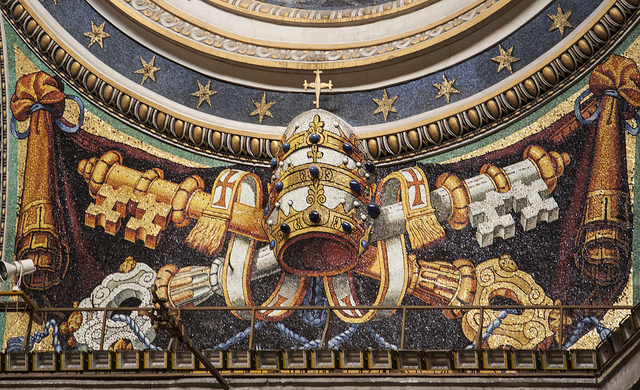
Today, the English-speaking world is very different, in regards to Catholicism, than it was in former times.
For if we look back at English culture even two centuries ago, we find a profoundly Protestant culture, which is not unlike Scandinavia in the extent to which Catholicism was all but wiped out.
Today, England does not so nearly resemble Scandinavia in this way and there are reasons for that fact.
The main one, of course, is Catholic Ireland. For massive Irish immigration changed Britain—just as it changed her former dominions, such as Australia and Canada.
But, to stay with Britain, it was this immigration that has largely been responsible for establishing the Catholic presence in England and Scotland, which now renders them different in this way from Scandinavia.
Of course, there have been other factors to the restoration of English Catholicism. For example in 1829, Catholic Emancipation was passed in parliament, restoring rights denied to Catholics for centuries.
Moreover, England began to witness a startling, unexpected flow of Catholic conversions amongst her cultural elites. St. John Henry Newman, for example, rocked his Oxford world by abandoning the Church of England for ‘primitive, superstitious’ Catholicism.
Still another factor was the life of Hilaire Belloc.
Belloc, of course, was not a convert, but his lifelong programme of Catholic restoration influenced so many English conversions, including those of Evelyn Waugh, G.K. Chesterton and Siegfried Sassoon.
Yet Belloc’s impact went far beyond this. Now, as it happens, I am currently writing a long review of Joseph Pearce’s biography of Belloc, which may be helpful to quote at this point:
One thing Pearce’s biography reveals is how well-known Belloc became in his own day. Belloc was publicly admired or abhorred by a whole host of the great British literary figures of the age. All kinds of literati made very public approbations or condemnations, including Evelyn Waugh, H.G. Wells, George Bernard Shaw and Virginia Woolf …
Sir Herbert James Gunn once gave a sketch of Belloc to the future Queen Elizabeth, who expressed her delight, saying she would hang it in her quarters. Although this is probably nothing more than royal protocol, it is nevertheless revealing of Belloc’s cultural impact. Belloc was also welcomed in private audiences with both Popes and political leaders – including President Franklin Delano Roosevelt.
One cannot imagine any deeply traditional Catholic, as Belloc was, having such effect in British and American life today …
All this is to say, dear Lector, that the more I peer into Belloc’s programme—again, that of Catholic restoration—the more I see how very much we owe the man today.
For just as we forget how much the English religious landscape once resembled Scandinavia, we also forget how dimly ‘primitive’ Catholicism was once regarded in English culture.
As it happens, Belloc himself can help to illumine how his Protestant contemporaries regarded the Catholic faith:
To the man of Protestant culture, the process leading to the Reformation seems obvious. From a variety of causes, knowledge vastly expanded at the close of the Middle Ages.
Geographical discoveries followed each other rapidly and on a new scale of greatness; a true idea was acquired of the earth and heavens; arts improved; at the same time antiquity was rediscovered; original manuscripts were closely examined; a science of history began. The period is known as ‘The Renaissance’, the New Birth of Europe.
Under such an influence, the myths of a thousand uncritical years were exposed and dissolved.
The institutions founded on these myths (the Papacy, the Mass, reliance on imagined influences of shrine and relic) were sapped, and with them crumbled all the society they informed.
And Belloc continues:
To these men, Catholicism seems a phase of thought present among their ancestry, natural to their blood, creative in its day, but now exposed as demonstrably false. It lamely survives today- principally in women – through a mere adhesion to traditional and homely things. It is also supported politically (but without conviction) by those who act from affection for the past, from fear of disorder, or from mere interest. Its life, however, has departed. The Church is a corpse.
Now, Reginald Jebb once added to these observations above:
Against this background [Hilaire Belloc] erects the majestic figure of the Church Universal, the creator of our civilization, the pearl of great price. The arguments of his opponents appear paltry in face of the thing they have lost – a thing continuing, resplendent, immortal, because it is divine, the maker of Europe and the hope of the world.
Reginald Jebb, it should be said, was another in Belloc’s long, long line of English conversions – as well as his son-in-law.
The above quote is taken from Testimony to Hilaire Belloc, a long out-of-print book Jebb co-wrote with his wife Eleanor, Belloc’s daughter.
And today, I should like to quote from the Jebb’s old book at some length – for it gives remarkable, first-hand witness to, as Jebb puts it:
[Belloc’s] powerful influence upon English Catholics of his day – and indeed Catholics all over the world – and upon the position of the Church in [England].
Foreword for Monarchy by Roger Buck
Yes, here is a very revealing passage indeed, regarding Catholic restoration in the English-speaking world. I shall not say more, but commend it to your careful study, dear Reader, if you care about such things as the restoration of Catholicism …
When Belloc began to make his name as a writer, Catholics in England were still under a cloud. Overt persecution, which in the centuries following the Reformation had reduced them to a small despised minority with little or no rights in the country of their birth, had ceased in 1829 when the Act of Emancipation became law, but they were still regarded by the general public as an anti-national clique and hence made to feel the inferiority of their position as compared with the rest of the population.
Though entry into the professions had been granted to them by degrees, all the highest offices of the State were still out of their reach. Prolonged propaganda had done its work: The mind of the English had been poisoned against the Faith of their fathers.
Into this group of rather timid Catholics, Belloc strode with the supreme confidence of youth and unfaltering conviction.
So far from apologizing for the Faith that he held and remaining on the defensive, he went straight to the attack denouncing those who through greed had organized the change of religion and pouring scorn on the historians who had shaped history to conceal the plunder.
He proceeded, as we have seen, to demonstrate how the Catholic Church had made the civilization of Europe and how England, by an accident as disreputable as it was calamitous, had broken away from the life-springs of her destiny.
The effect upon English Catholics of this turning of the tables against those who had oppressed them was profound.
They were filled with a new confidence and began to develop a new outlook. Not only did they realize more fully than before the extent and magnificence of their heritage, but they were helped to relate all their pious observances and private devotions to the overriding claims and promises of the Faith.
Hope sprang up anew as they felt themselves to be the heirs of the true English tradition relying upon supernatural guidance and the universality of its message.
Like one of the ancient prophets Belloc appeared, with all the personal equipment most needed for the situation, at a moment of hesitation and timidity. Great leaders there had been and were, but the rank and file of Catholics were oppressed by a sense of inferiority.
It was his great achievement to sweep all that away and give to history a new meaning. A man of the world, with high talents and influential friends, most of whom knew little or nothing of the Catholic Church, he set himself to explain and magnify the Faith that was in him in all kinds of company, for it was by no means only in his writings that he carried the standard of the Faith into battle.
He habitually spoke of it, as he would speak of -say- the law of gravity, as something established and certain, which only ignorance would gainsay, and moreover something which it was as natural to discuss in ordinary conversation as the boat race or a General Election.
Naturally enough, there were those among his fellow Catholics who thought this onslaught exaggerated and perhaps dangerous. They had become accustomed to defer in non-religious matters and even in some of their own tentative proposals for a greater measure of justice to Catholics, to the opinions of non-Catholics, and were afraid that Belloc’s outspoken challenges would lead to additional restraints.
With this kind of person he had little patience, and perhaps it was partly for this reason that he always expressed horror at the possibility of becoming ‘an official Catholic’. He had taken a line of his own and was determined not to be identified with any group, however influential, and especially, a group with which he had many points of disagreement.
This repugnance to any sort of officialdom may sometimes have caused him to over-emphasize the isolation of his own position and given him a secret pleasure in shocking those whom he felt to be following too passive a line. It also no doubt added to his reluctance to accept any official honour.
When asked to accept the award of Companion of Honour he begged to be excused, and he declined to stand for the Professorship of Poetry at Oxford, though this was probably due more to a lasting grudge against the University for having refused him a Fellowship than to the nature of the offer.
Also, when without previous intimation, he was informed that he had been granted a Papal honour, his reaction was more one of annoyance than of pleasure.
There was, however, one exception to his aversion to these symbols of recognition: he prized his ’bouton’ of the Legion d’Honneur and, later, his promotion to be Chevalier of that Order. That may have been partly because he had a higher opinion of French awards than those granted in England: but probably also because acceptance of a French honour did not put him under any obligation to an authority which he had so often attacked.
But though he thus kept ready to his hand, and had no hesitation in using when he thought fit, weapons with which to attack those who would curb his energetic championship of the Faith in England, his lasting work in this domain was constructive.
He inspired his fellow Catholics with the broad outlines of their religion, presented to them with a zest and conviction that both instructed them and tired them with a new zeal. The success of his efforts in this campaign may be seen, not only in the greater influence of Catholics in public affairs today than at the time when he began to write, but also in the predominant attitude of Catholic authors of the present time towards Catholicism.
No longer does it appear to them so necessary to emphasize the part the Church has played in history.
Belloc has established that general thesis, and the writers who continue along these lines are filling in omissions and correcting blemishes rather than vying with him in putting the Church on the map.
But there is another noticeable development, particularly among novelists. The tendency now is to take for granted the presence of Catholics in every rank of society and knowledge of the general nature of the dogmas to which they subscribe.
The main interest, where Catholic characters appear in novels, seems to be the particular problems that beset them, their weaknesses, and the clash of loyalties in which they are involved.
It is the finesses of the Catholic conscience itself, rarely the more obvious differences between the Catholic and non-Catholic outlook on life, that are worked out in the story.
This is a change that could hardly have come about in England, had it not been for Belloc’s ground work.
In France, and other countries in which understanding of the Catholic Church has always been present, this type of novel has long been in existence, but here it is only a recent growth.
But his influence among his fellow Catholics is too well known to need underlining. The countless letters he receivcd during his active lifetime, and those which have poured in to Eleanor and myself since his death, and indeed in those fallow years of his old age when contemplation replaced activity, register in an extraordinary degree the effect upon others of his Catholic writings.
Over and over again there have been instances in which correspondents, who have never seen or known him, would express their profound thanks to him, not merely as a writer, but as a man (so direct was the appeal of the words he used), for the encouragement be had given them in their Faith and the light that he had shed upon it.
They felt that he was an ally upon whom they could rely, and one who raised them above the difficulties and doubts that beset them into the splendour of the heritage that was theirs.
That is all for today. There will be much more to say about Hilaire Belloc and Catholic restoration soon …
Foreword for Monarchy by Roger Buck
Buying Books at Amazon Through These Links Gives Us a Commission. This Supports Our Apostolate. Thank You if You Can Help Us Like This!

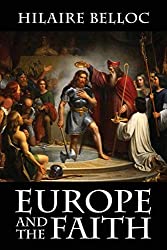
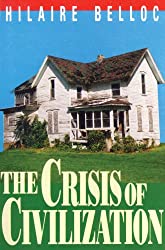
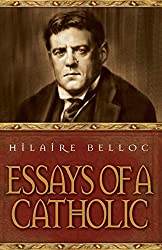
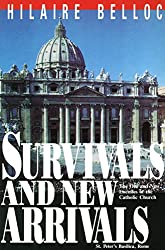




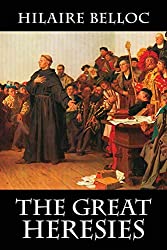
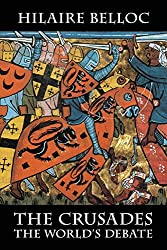
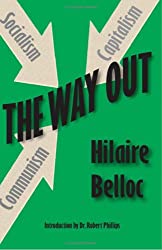
Comments
comments are currently closed
4 responses to “Catholic Restoration and Hilaire Belloc”
[…] It is about why the only hope for the Western is the Mystical Body of Christ and therefore the need for Catholic restoration. […]
We are still under the Luciferian Regime of the French Revolution that ‘your’ Belloc supported!
Hillaire Belloc, the Liberal – Part I
‘Only Ill-Informed Catholics
Condemn the French Revolution’
Patrick Odou
This series will analyze Belloc’s position on the French Revolution and the Modern State. I based myself on several of his books, but principally on The French Revolution (New York: Henry Holt, 1911, 255 pp.)
The French Revolution, which Belloc wrote in 1911 when he was 41, is an apologia of that revolution. He is a clear admirer of the French Revolution. I believe that there are many errors from a Catholic perspective in this book. Here I will address only one, which is the principle thesis and contention of his work. Belloc tries to convince his readers that there was no conflict between the Revolution’s concepts of State and Religion and those of the Catholic Church.
Hillaire Belloc supported the French Revolution’s political theory.
“My” Belloc?
If you’ll forgive me, may I say I think he’s your Belloc too. The entire Catholic Anglosphere owes so much to him. And I assume you belong to the Anglosphere . . .
As Frank Sheed wrote:
“More than any other man, Belloc made the English-speaking Catholic world in which all of us live. There was Chesterton, of course, but then Belloc had so much to do with the making of Chesterton, and Chesterton not much with the making of Belloc”.
It is clear, if you know history, what Sheed means by Belloc making the English-speaking Catholic world.
But you are also right that we are still left with the dreadful effects of the French Revolution! Important here to note is that Belloc’s views evolved over time.
In my opinion, if you want to write with depth and substance on this complex topic, you will need to go far, far beyond that 1911 book, on which you say you have principally based your work. You will need to consider very complex factors in the evolution of Belloc’s thought up through 1938, at least.
I cannot comment much more and comments are about to close on this site, which is being relaunched, as I no longer have time for comments.
But Belloc became in time a Monarchist, the antithesis of the French Revolution. See my piece here about this if you like.
And I encourage you to not only study many of Belloc’s books over the decades to grapple with this intricate, nuanced topic but also to study why Chesterton, Frank Sheed and countless Catholic Trads see the power and beauty of all Belloc did for the English-speaking world.
If you do, you just may agree he’s our Belloc! : – )
For even if Belloc did remain with these 1911 views (and he didn’t) it wouldn’t thereby negate everything else the man said or did for the Faith . . . So I encourage you to look deeper and grapple with many different aspects before pronouncing judgment.
We are still under the same Luciferian Regime of those involved in the French Freemason Revolution that ‘Belloc’ supported!
Hillaire Belloc, the Liberal – Part I
‘Only Ill-Informed Catholics
Condemn the French Revolution’
Patrick Odou
This series will analyze Belloc’s position on the French Revolution and the Modern State. I based myself on several of his books, but principally on The French Revolution (New York: Henry Holt, 1911, 255 pp.)
The French Revolution, which Belloc wrote in 1911 when he was 41, is an apologia of that revolution. He is a clear admirer of the French Revolution. I believe that there are many errors from a Catholic perspective in this book. Here I will address only one, which is the principle thesis and contention of his work. Belloc tries to convince his readers that there was no conflict between the Revolution’s concepts of State and Religion and those of the Catholic Church.
Hillaire Belloc supported the French Revolution’s political theory